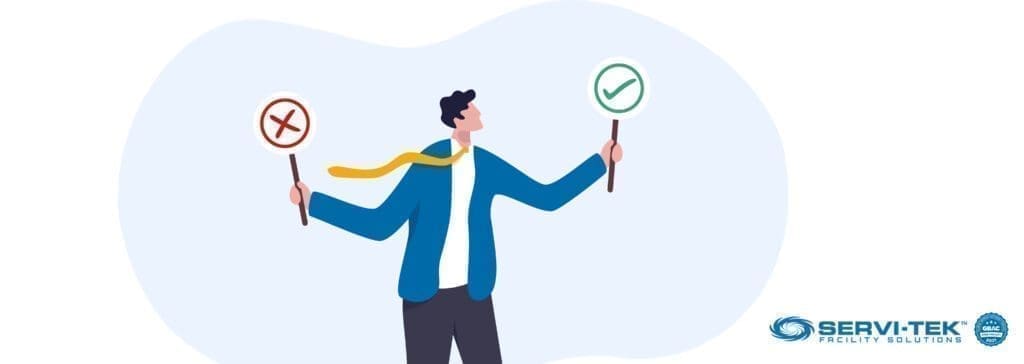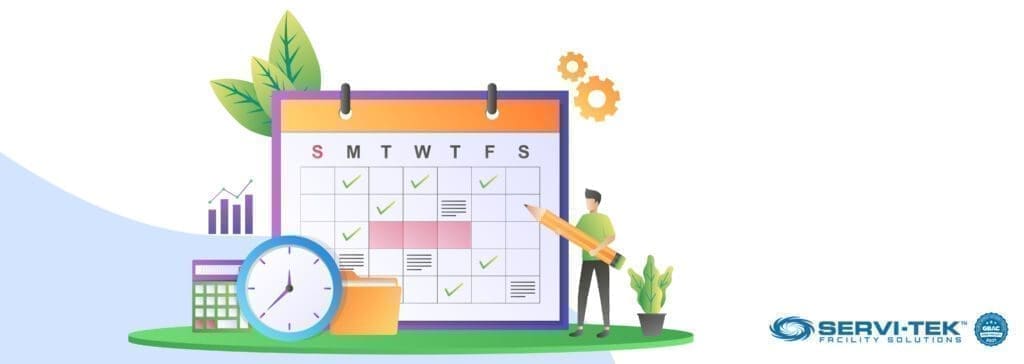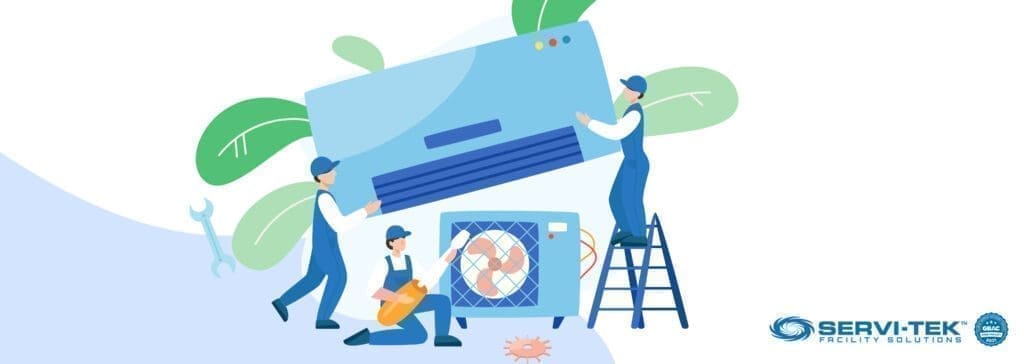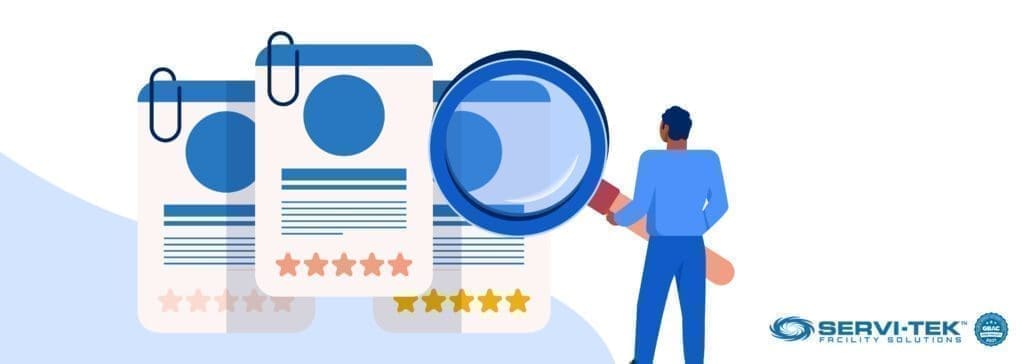Are you considering hiring a business cleaning service?
Allowing someone access to your company might be a difficult decision. You want to make sure that sensitive information and precious equipment are kept safe and secure.
After all, the last thing you need is another source of stress and money wasted.
Whether you already have a commercial cleaning firm or are planning to employ one, there are a couple of things you should know about commercial building cleaning.
What are the facts? Continue reading to find out:
Start on the Right Foot
The standards of cleanliness have evolved since the Coronavirus and each square foot of the premises could potentially harbor pathogens. Even a clean building might need routine disinfection in areas including hallways, clean carpets, fixtures, blinds, and hard surfaces.
In addition to the basics, commercial cleaning companies are expanding their disinfection capabilities.
Some providers of specialty services are deploying electrostatic disinfection systems, particularly in buildings with vulnerable occupants such as medical facilities. Public health agencies are encouraging more robust disinfection strategies using education, advertisements, and other ads and means of promotion.
Preliminary estimates suggest that COVID-related fatalities are sinking, however, the contagious Delta variant is still a concern.
Building managers are challenged with getting back to standard operations with a greater focus on limiting germs.
One concern among those using an in-house cleaning staff is the increases in wages, with more costly hourly rates.
The rise in wages may represent a motivating factor for building management to consider a third-party cleaning contractor.
A professional provider of cleaning and janitorial services might have various ways of reducing their costs that increase affordability. The organization and its employees might have devised cleaning methods that increase the efficiency of processes.
For example, a commercial company might have knowledge that allows for quickly cleaning a large number of windows. The process could involve using certain cleaning products that reduce the amount of effort needed to dry the glass.
In addition to products that allow for greater efficiency, cleaning experts can reduce costs by purchasing products in bulk.
Just like in most types of service work, professionals understand the importance of having the right tools for the job.
Managers with responsibility for large buildings with significant square footage should understand some basic facts regarding commercial cleaning.
Choose The Right Cleaning Service

Aside from commercial cleaners, commercial building maintenance services are important, particularly for medical centers, educational facilities, and other high-traffic areas.
Tasks including dusting, trash removal, vacuuming, mopping, sweeping, and floor cleaning are often now being performed by third-party professional cleaners.
A professional company has experts with years of experience in maintaining a clean environment free of grime and dirt.
One first step for a facility professional to take when potentially hiring a commercial cleaning company is an analysis of your needs.
This is a process of identifying the specific tasks that the third-party company needs to perform. In doing this, the best course of action would be to create an outline of the plan in writing.
The goal in creating this assessment is for gaining an understanding of the needs of the facility.
When considering a commercial maintenance company, an organization must ensure that the contractor they choose covers these services. The alternative would involve potentially using multiple service providers to have all of the tasks properly performed, which translates to additional hassle, time and money wasted.
Some commercial cleaning or janitorial providers specialize in certain types of work, such as those who exclusively clean exterior windows. Other companies offer a more comprehensive array of services and function as a “one-stop-shop.” It might be necessary for a facility with some highly specialized or unique needs to retain multiple organizations.
For example, perhaps your facility needs bi-weekly exterior pressure washing services in the parking or walkway areas. Some of the commercial organizations might tell you that they are currently unable or not equipped to perform this work.
Many facility managers will seek to avoid the hassle of pursuing a secondary provider specifically for these tasks.
Another key consideration when evaluating a provider of services involves their experience level.
It is important to remember that years of experience do not necessarily translate to high-quality work performance. For example, a company that performs very average quality work may cite many years of experience. Try to find a service provider that is willing to disclose some references that will attest to their performance.
Does the commercial cleaning company have a top-quality team of employees to perform the tasks?
Keep in mind that each service provider will experience some degree of staff turnover, particularly among part-time staff. Equally as important is whether the staff is properly screened and background checked.
In many instances, the employees of the cleaning provider that you choose will likely be unsupervised at times.
This might apply when cleaning work is performed after business hours, such as during the evening or weekend hours. If the staff will be present during business hours, you might need to consider how your customers will perceive the staff.
Next, we will identify ten of the key aspects of the commercial cleaning industry today that you must know:
1. Industry Trends

As with most industries or sectors, those operating in the realm of commercial cleaning are adopting new forms of technology.
In the past, the majority of tasks were performed manually without assistance from the efficient tools used today.
The internet has transformed most businesses by allowing for significantly improved aspects related to communication. The majority of commercial cleaning companies will use mobile devices and apps daily for certain activities.
For example, a supervisor of a team of cleaning professionals may remotely monitor their workers, such as to confirm their arrival.
Commercial facilities today now deploy more “smart” equipment and technology than ever before.
Many of these technologies that are now found in commercial environments became increasingly more in demand since the COVID-19 pandemic.
Examples include touchless devices for drying hands, dispensing hand sanitizer, and other non-contact alternatives.
2. Contracts & Agreements

Typically, any new working relationship between a business and a commercial cleaning company will have a contract.
One way that a contract is defined is any form of a binding agreement that involves two or more parties. Another definition is an agreement that summarizes a business relationship involving an exchange of goods or services for a price.
In this context, a contract for commercial cleaning services is a binding agreement that both parties voluntarily enter. The contract should explain the scope of the work that will be performed in some detail. Contracts are critical for defining the responsibilities and expectations associated with the service agreement that both parties agree on.
The contract must have the contact information of the parties involved and specify the start and end date.
Many cleaning contracts are annual, meaning they describe a business arrangement that spans one year.
Some of the most important parts or terms of a contract include:
- A clear outline of the services to be performed with a description when needed.
- Details regarding access to the building, alarm codes, and hours of entry.
- The frequency when certain tasks will be performed such as daily, weekly, or monthly and overall schedule.
- The names of buildings, departments, or other descriptions related to the location.
- How performance will be assessed or reviewed.
- Payment amount, frequency, method of payment, terms, etc.
3. How to Evaluate a Cleaning Company

Evaluating the provider’s performance is one of the critical tasks that a building manager must do, for the health and safety of the commercial property.
When a business devotes limited resources to these services, expectations generally develop. Many experts claim that evaluating providers of services is more challenging compared to assessing those who provide products.
Although different people may form conflicting opinions when assessing the same product, this is usually more common for services.
Many facility managers will create different areas of assessment. Some of these examples may include:
- Does the cleaning team demonstrate consistency in adhering to the schedule and working promptly?
- Are quality standards being made? This might involve the appearance of the floors or the cleanliness of the bathrooms.
- Is the organization properly maintaining its equipment and stock of supplies?
- Is the management responsive when contacted?
Smart facilities management professionals recognize that the commercial cleaning activity may create liability concerns.
For example, a team member might begin mopping the floor and fail to place a “wet floor” or similar warning sign. These types of mistakes may create opportunities for potentially dangerous slip-and-fall accidents.
One of the most important aspects when considering liability relates to business insurance coverage. Failing to maintain sufficient insurance makes any business vulnerable to potentially serious and expensive consequences.
The company you choose must be insured and covered, for your safety.
Property insurance is a form of coverage that might apply when incidents occur, such as a fire or theft. This form of coverage may apply to large assets including the building, machinery, and other costly concerns. In many cases, a property insurance policy may extend beyond merely the loss or damage to physical assets.
Property insurance policies may be created to sustain a business when a problem creates losses of operating income. For example, a building with significant water damage might require halting all operations for days, weeks, or months.
Liability insurance protects a business from civil liability that may apply. Perhaps a product manufacturer had a group of products that were all defective and caused injuries among customers?
It applies when the business is accused of failing to maintain safe property conditions that resulted in a serious injury.
As an employer, know that a cleaning business has the responsibility for maintaining the worker’s compensation coverage.
This form of coverage is used for paying medical expenses and lost wages for employees injured on the job. Worker’s compensation coverage generally provides a death benefit to families of workers fatally injured at work.
A business owner’s policy typically refers to some package or bundle of coverage options. Often, these policies combine property, liability, and other forms of coverage.
Some may include business income coverage that will keep operating expenses paid in case of a major disaster.
4. Building Inspection

An inspection is usually a formal visit that involves ensuring that an operation is legal or safe. They are performed by someone that has a specific specialty or form of training.
In terms of commercial cleaning services, inspections are critical in the preparation of any program of cleaning and disinfection. Closely analyzing the property allows for the prospective cleaning company to understand the needs of the facility and logistical details. For example, determining the “high-touch” area with constant traffic, supply, and equipment storage sites, and identifying staircase and elevator locations.
Aside from the initial and more informational survey or inspection, ongoing evaluations must continue for quality control and performance assessment.
Building inspections are needed for gauging the performance of the cleaning company and generating feedback. Ideally, a regular inspection schedule is included as a part of the original contract that all parties sign.
Inspections will identify problems with quality, notify appropriate supervisory staff, and result in a response and solution.
Similar to preventative maintenance, having a proactive inspection process helps in averting prolonged problems.
Often, the responsibility for conducting inspection lies with the commercial cleaning company itself as a means of quality control.
The cleaning and janitorial service provider may delegate these duties to an on-site supervisor. Many inspections are conducted using a customized checklist type form with numeral or letter grades that reflect the assessments.
The inspection checklist or form might be organized by area, department, building, floor, or task.
For example, a section heading might include restrooms, lobby, entryways, 1st floor, conference room, etc.
The inspections performed by a cleaning company supervisor equate to internal methods of quality control. Among the more detailed types of inspections or tests available involves adenosine triphosphate or an ATP measurement device. ATP is a scientific means of detecting or testing for the presence of microorganisms on surfaces.
The ATP process reveals the effectiveness of the cleaning company’s processes of cleaning and disinfection. The measurement is conducted using relative light units (RLUs) for detecting organisms on a swab sample of the surface.
Apps and other tools supported by mobile devices are allowing for significantly more technology use in the overall inspection processes.
5. Commercial Cleaning Products

Heavy-duty detergents often referred to as industrial-grade detergents, are commonly found in the forms of alkaline powder.
These products have proven effective in applications such as the removal of oil, grease, and rust, as they penetrate accumulations on surfaces and allow for dispersal of unwanted deposits.
Light-duty agents often referred to as “general purpose” products, are appropriate for many types of surfaces. These products usually pose no risk of fire and are increasingly more eco-friendly than ever before.
The cleaning of electronics and similar components often involves a solvent cleaning agent that has proven to be safe. The Environmental Protection Agency (EPA) developed a Safer Choice initiative that identified many health-safe options.
Solvent-based cleaning products represent a viable option for keyboards, screens, and other desktop items in office environments. They might exist in forms such as wipes or sprays that are dried with materials that absorb well.
Items such as metals generate corrosion, which commonly calls for a scale remover or similar products. Corrosion is a process that might be prevented, controlled, and managed. A scale remover will clean various metals efficiently and often contains citric acid and other types of liquids.
Certain hydrochloric acid de-scalers have proven effective in shielding materials including copper, steel, and brass. Applications might include the removal of limescale and similar substances from components on boilers and heat exchangers.
The options are plenty, so you need a professional who knows what to use, when and in what concentration, to not affect your goods, your health, and costs in the long run.
6. Master Calendar

The master calendar ordinarily projects the schedule for the coming months or years.
The schedule contains key plans including the equipment to clean, tools used, interval or frequency, and those responsible for completion. The key in developing an effective calendar is that it is realistic in terms of time and available personnel.
An experienced commercial cleaning company will understand the process and identify areas of concern including equipment, walls, and other objects.
Restaurants, hotels, and food processing facilities must address sanitary concerns to comply with various governmental entities.
These regulators might be the FDA, OSHA, the USDA, and other institutions with responsibility for oversight.
7. Spotting Pollution, Health & Safety

In a commercial building, indoor air quality is among the most critical aspects regarding pollution because of potential safety risks.
The health, safety, and comfort of all building occupants may be impacted by problematic indoor air quality.
EPA is among the leading organizations that address concerns related to pollution.
Some of the most influential factors associated with indoor air quality include design, ventilation, moisture, and humidity. Part of the challenge is identifying the specific sources of health threats, which are not always apparent.
Pollutants can be loosely categorized as either biological contaminants, chemical pollutants, or particles such as airborne solids or liquids.
After determining the source, the pollution problem must be remedied. Common solutions include implementing physical barriers, adjusting air pressure, filtration, dilution, and temperature modifications.
8. All Commercial Cleaning Companies Are Not the Same

Building owners and facility managers know that quality and performance may vary considerably between most service providers.
In the field of commercial cleaning, there is often a tendency to focus on the experience. Plenty of those making these decisions prefer a cleaning company that has performed services for others in their specific industry.
Two of the most critical considerations involve different aspects of consistency and reliability.
Is the organization consistently adhering to the agreed-upon schedule?
Much of the success or failure of a commercial cleaning company derives from the quality of its employees. For example, a company with excessive staff turnover will likely struggle in demonstrating consistent quality and struggle with scheduling adherence.
Further potential problems are likely when frequent turnover involves staff at the supervisory or management levels.
Maintaining regular communication is among the central keys for success in these working relationships.
Examples include providing feedback, maintaining a regular plan of evaluating performance, and seeking opportunities for improvement.
9. When to Call a Cleaning Professional

Facility management professionals often identify a need for a commercial cleaning company during periods of transition.
Perhaps the in-house cleaning staff is underperforming or the costs of recruiting, training, and supervising the team are unsustainable?
The facility might be using multiple providers for different specific cleaning tasks that have become time-consuming and challenging to monitor.
The building might have a current service provider that struggles with reaching the expectations for quality.
In many cases, the facility manager is the one to determine that an existing provider doesn’t offer a good overall value.
The expenses associated with the commercial cleaning provider’s services might seem excessive compared to the results.
Often these considerations are triggered if an organization is moving or relocating to a different physical location.
The company might be merging or consolidating its operations that will create increased demand for regular cleaning.
10. Get References

Checking references is an important step when making key decisions such as choosing a provider of commercial cleaning services.
References include anyone that the prospective service provider refers that will attest to the quality of its work.
Keep in mind that the majority of service providers will expect reference requests and have already set a database of loyal and satisfied clients. References should be contacted briefly without consuming an excessive amount of their time.
Ask the basics about the company’s efficiency, way of work, professionalism, and any specifics that apply to your needs.
Experienced Team of Commercial Cleaning Professionals for Commercial Settings
What could be better than finding a business cleaning company that can meet all of these facts? Working with one that goes over and above.
Servi-Tek Facility Solutions is an organization that is committed to embracing innovative and customized programs for its many clients.
We work with our customers to create a detailed plan of action that continuously develops, adapts, and improves.
We encourage you to contact us today for a free professional consultation.




